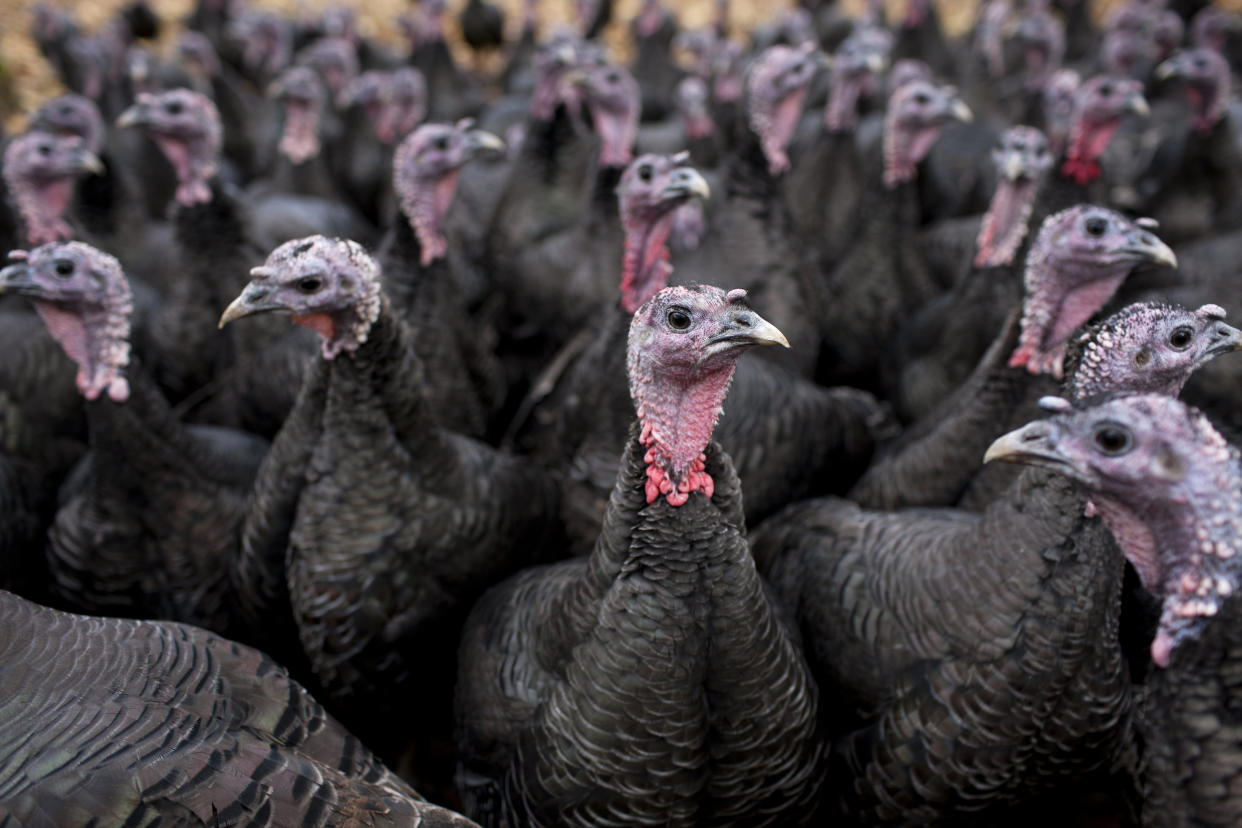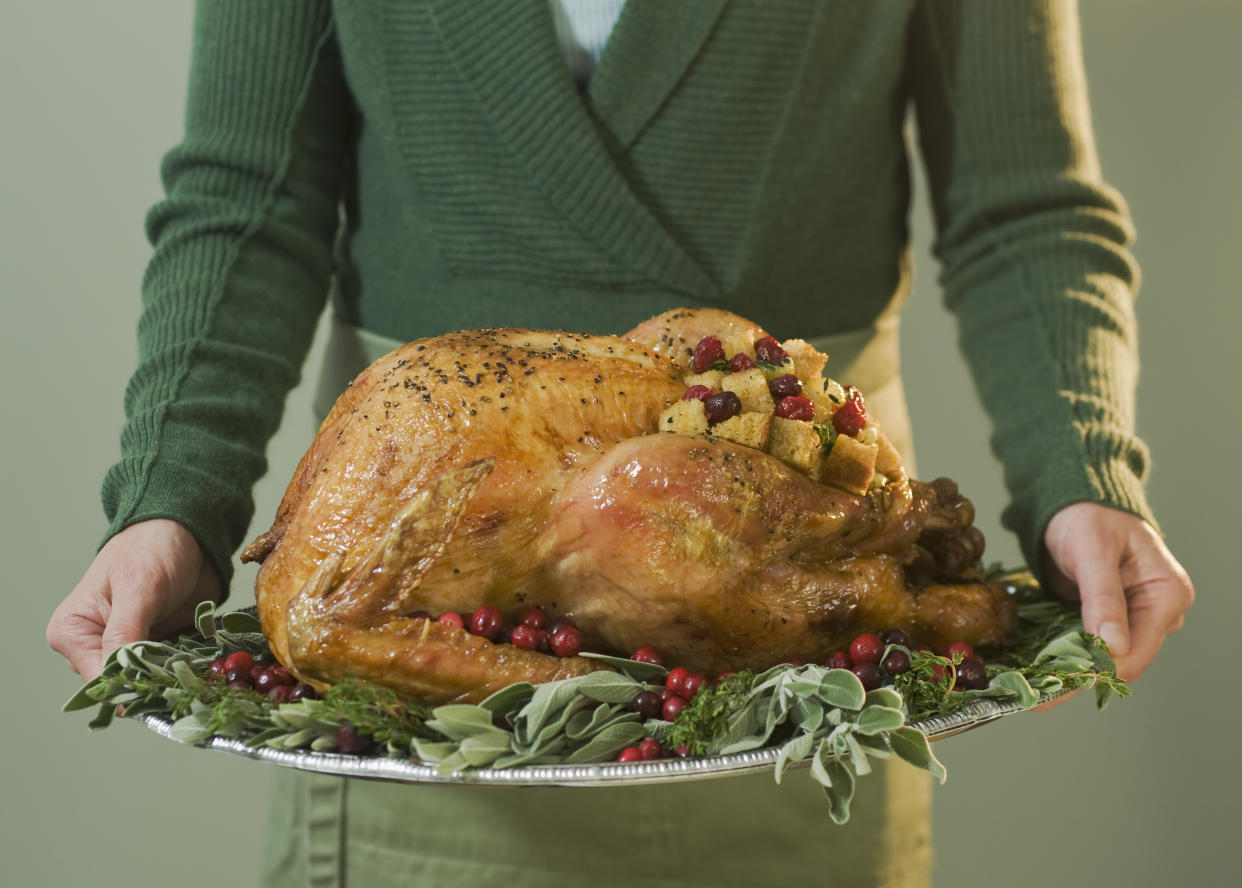Is your Thanksgiving turkey safe to eat? Here's what you should know about bird flu.

Ever since the U.S. Department of Agriculture warned of a “highly pathogenic” strain of avian flu, also known as bird flu, earlier this year, outbreaks of the virus — as well as Thanksgiving turkey prices — have been flying high.
Let’s talk turkey prices
The price of turkey is up 21% from last year, at an average of $1.81 per pound, according to a survey from the American Farm Bureau Federation.
And for some, that price may be too much to swallow. Due to rising food costs, 18% of people plan on forgoing the traditional turkey dinner and switching to a less expensive alternative, according to a recent survey by FinanceBuzz.
“For families that don’t love turkey, historically it hasn’t been a huge financial burden to include on the menu, and it’s been included symbolically more than for enjoyment,” Josh Koebert, an author of the survey, said in an email to Yahoo News. “With rising costs, many families are realizing it may not be worth the extra cost this year.”
So what’s driving the prices?
In 2022 alone, 628 bird flu outbreaks in 46 states have killed more than 50 million commercial poultry and other birds — either because they died of the virus or because they were euthanized to prevent the spread of the disease to other livestock — nearly matching the largest bird flu outbreak to date, which occurred in 2015 and affected 50.5 million birds in 21 states.
This year, the turkey industry has lost more than 8 million turkeys to bird flu, representing over 3% of turkeys slaughtered last year, according to the U.S. Department of Agriculture. Because a larger share of turkeys in this bird flu outbreak were from breeding stock, the USDA says it could take longer for the turkey industry to recover from this outbreak than from the 2015 outbreak.
The resulting turkey scarcity is driving up costs for consumers, but it isn’t the only factor. NPR reports that drought in the U.S. and war in Ukraine have pushed up grain prices, meaning that feeding surviving turkeys costs almost twice as much as last year. In an interview with Watt Global Media, which monitors the poultry market, FarmEcon president Thomas Elam explained that the effects of bird flu coupled with rising inflation costs has resulted in extra-high turkey prices at the grocery store this year.
“Traditionally, retailers have absorbed a lot of the wholesale price of turkeys around Thanksgiving and Christmas,” Elam said. “But since January, we've had 20% to 25% increases, and it's been a steady increase in wholesale whole bird prices. Frozen ones and fresh birds are up even more.”
Is my turkey safe to eat?

Though your turkey dinner may be stuffed with a cornucopia of extra costs this year, you can rest assured it’s safe to eat.
Infected turkeys or those that may have come in contact with sick birds are euthanized before they can enter the food system, but you should still take proper precautions. The CDC says that cooking poultry and eggs to an internal temperature of 165˚F kills bacteria and viruses, including bird flu viruses; and there’s no evidence that anyone has gotten bird flu after eating properly cooked poultry products. As with any raw meat, you should also wash your hands before and after handling uncooked turkey.
“Influenza viruses can survive for several hours on surfaces, including raw bird meat. However, cooking kills viruses,” Dr. W. Ian Lipkin, director of the Center for Infection and Immunity at Columbia University Mailman School of Public Health, said in an email to Yahoo News. “The greater risk is infection with the bacterium salmonella. It is important to prepare turkeys for cooking on cutting boards that can be washed with soap and hot water, and to wash your hands before touching foods or your face.”
The CDC says humans rarely get bird flu, and the risk to the general public is low. Those more likely to contract the virus are people working in jobs with prolonged, direct exposure to infected live birds. Since the World Health Organization began tracking human cases of influenza A (H5N1) virus — the predominant strain of bird flu in Europe and North America — there has been only one case reported in the U.S. The individual contracted bird flu earlier this year while slaughtering poultry at a commercial facility in Colorado.

